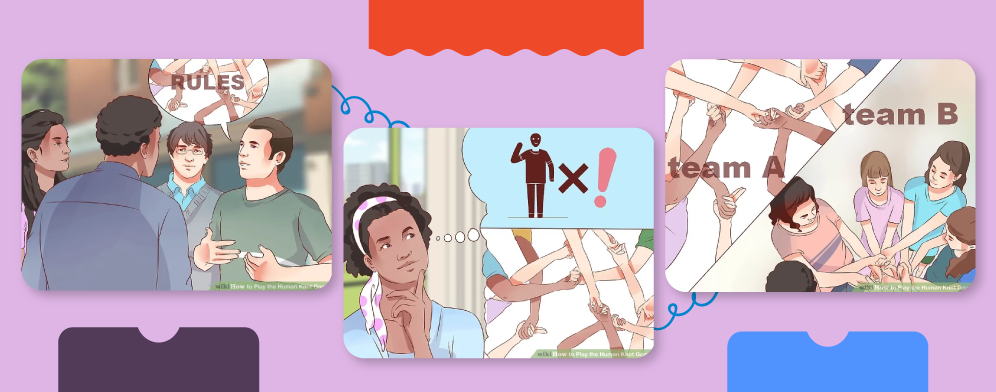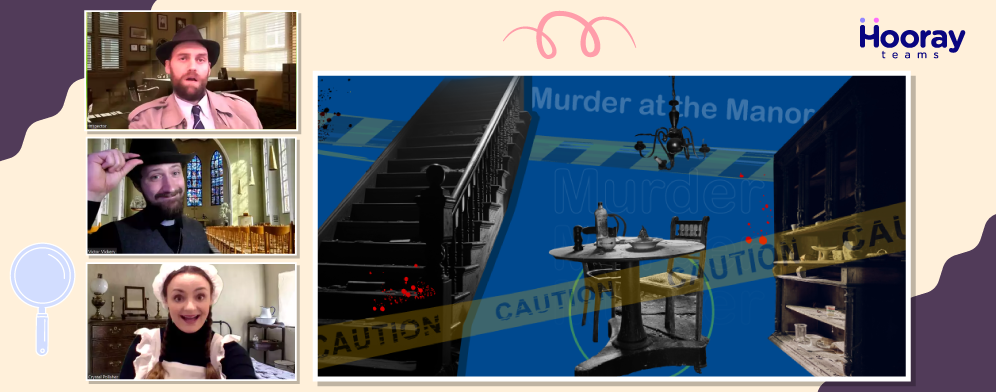1. Why Are Team Building Exercises Essential in Workplaces?
Team building exercises for work colleagues promote functional communication, providing the scaffolding for more effective working relationships. By creating a sense of trust and unity, they encourage employees to have open, frank discussions with one another that can ultimately speed up the process of finding solutions to any project issues that arise.
2. Team Building Exercises for Bonding
2.1. Human Knot

The Human Knot is one of the most popular team building exercises because it’s simple to explain and requires no prep of any kind. The activity generally takes about 15 to 20 minutes and can only be performed in person, rather than virtually.
Divide everyone up into groups of between 5 and 10 people. Have each group stand in a circle, then ask them to reach out their right hand to clasp the right hand of another person. Now ask them to reach out their left hand to grasp a different person’s left hand. Once that’s done, each group must try to untangle themselves without releasing the hands they are holding.
This game develops clear communication and group discussion, as it’s impossible to untangle everybody without cooperation. It’s also an interesting way to probe which members of staff are good at solving spatial problems and which ones are naturally inclined towards assuming a leadership role.
2.2. Gutterball
Also known as the Pipeline game, gutterball is a fast-paced game that can take as little as a minute or as long as 10 minutes, depending on the level of difficulty. It does require specific equipment, but this can be cheaply purchased online.
Divide everyone up into teams of about 5 people and give each person a piece of gutter pipe, as well as one ball per team. The goal is for the quintet to move the ball from the start line to the finish line as quickly as possible without dropping it. The team that does this in the fastest time is the winner.
In some variations, teams must start all over again when they drop the ball, but if you’re looking for quick team building activities, this rule can be set aside in favor of a time penalty for each drop. While gutterball doesn’t require the same problem-solving skills as the human knot, it does necessitate skilled teamwork to keep the ball flowing down the piping.
2.3. Scavenger Hunt

Scavenger hunts are a flexible team-building activity that can be played in person or virtually, in small groups or large ones. There are many variations, some taking just an hour while others occupy half a day, but all the scenarios promote team bonding and resourcefulness.
If you are playing remotely, the game can be played in teams using breakout rooms. Gather everyone together on a video conferencing platform and reveal a set of items that they must find within their house. This list can be either a straightforward checklist or take the form of cryptic clues. Set a time limit for team discussions and strategizing (about 5 to 10 minutes), before letting people loose to find the items (another 5 to 10 minutes). Once the time is up, reconvene everyone and award points for each item completed. The team with the most points is declared the winner.
If you prefer an in-person scavenger hunt, the easiest way to manage it is via a professional company like Wildgoose, who will take care of all the planning and hosting, or using an app like Scavify, which allows organizers to build their journeys.
3. Critical Thinking Team Building Exercises
3.1. Cast Away

How would you survive on a desert island? That’s the crux of this game, in which each person is allowed to choose 5 items that they would desire to have while trapped on an isolated island. These items can be practical or frivolous, but in either case, will reveal something about the mindset and personality of each participant.
Cast Away works well in both in-person and remote settings. In general, each person should be given 1 to 5 minutes to speak, including any time given over to questions from colleagues and any resulting discussions.
3.2. Brain Teasers
Warm up the mind with some classic brain teasers that are equally fun for virtual or in-person gatherings. There are lots of different kinds of puzzles that can be found for free online to include as part of a mini-game, including rebuses, quick crosswords, spot the difference, and riddles.
These 5-minute team building activities can be played by as many people as are present, either individually or divided into teams. After the time is up, reveal the answers and find out who fared the best. Brain teasers stimulate creativity, cognition, and concentration, which is why they are usually best used at the beginning of a team-building session or meeting.
3.3. Murder Mystery Game

Murder mystery games bring employees together for an exciting adventure that requires group problem-solving. Following in the footsteps of classic whodunnit detectives, teams must use a series of clues to figure out an elaborate homicide with multiple suspects and misleading red herrings.
It’s possible to purchase murder mystery packs so you can run your sessions with the team in the office, but it’s usually more entertaining to have a professional host oversee proceedings. Companies like Hooray Teams, for example, have several virtual murder mystery options, including a country manor, and Hollywood mystery. These are great for remote and hybrid teams to stay engaged.
4. Fun Icebreaking Team Building Exercises
4.1. Guess the Drawing
Bringing the artistic side of the staff to the surface, Guess the Drawing is an entertaining activity that is great for blowing off steam and encouraging staff to relax and socialize.
Divide participants into 2 or 3 teams. Each player takes it in turn to draw an image based on a prompt, which their teammates must guess within a minute. The game continues until everyone has had a turn at drawing.
This game can be played with as many people as desired, though bear in mind that the number of participants will affect the length of the game. If playing in person, prepare a whiteboard for people to draw upon. If playing online, video-conferencing sites like Zoom have built-in virtual whiteboards, or there are websites like Drawize that facilitate free screen sharing for team play.
4.2. Would You Rather
An amusing icebreaker that helps employees get to know one another better, Would You Rather is a speculative question game that asks people to choose between two hypothetical scenarios.
To get the game started, prepare a list of questions beforehand. These can be as work-oriented or as light-hearted as desired. For example, “Would you rather be James Bond or Jack Reacher?” or “Would you rather have more work than you could ever complete or hardly have any work at all?”
The game works best as a 10-minute introductory activity, to be followed with more skills-based games. To ensure people stay engaged, keep groups to sizes of no more than 20.
4.3. Charades

Charades is a dinner party favorite that can be adapted easily for a work setting. The object of the game is for players to act out a song, book, movie, or phrase so that their teammates can correctly identify the word or words. Create your suggestions from common office lingo or use a random charade generator to prompt staff.
Nudging staff to express themselves solely through gestures is a great way to nurture creative thinking and nonverbal communication, all wrapped up in a laugh-filled social atmosphere.
Charades can be played virtually or in person with as many people as you like, though the optimum number of participants is between 10 and 15, divided into groups of 4 or 5. Games usually last between half an hour and an hour.
5. Team Building Activities for Collaboration
5.1. Minefield
A paired activity that relies on solid peer-to-peer communication and trust, Minefield requires a blindfolded person to traverse an obstacle course with the help of their partner. The goal is to make it from the start line to the finish without touching any of the objects in the way.
If the space is available, you can set up several identical obstacle courses and have pairs race through. Alternatively, time how long it takes each pair to safely navigate the minefield.
This activity normally takes around 30 to 45 minutes to complete, depending on the complexity of the obstacle course and the number of participants. To ensure that staff don’t spend too long waiting around, it’s best played with at most 16 people or 8 pairs.
5.2. Escape Room Challenge

Popularized over the last decade or so, Escape rooms are collaborative puzzles that rely on lateral thinking and teamwork for success. Participants must use their problem-solving skills to work out how to break out from a dungeon, a haunted mansion, or numerous other eerie settings.
Escape rooms can be played in person at a location that has been specially designed for the purpose or virtually with the help of hosted platforms like Hooray Teams for remote teams in mind.
Most escape rooms last about 60 minutes and have been created for groups of between 4 and 8 people, though some cater for larger parties.
5.3. Jigsaw Puzzle
Go back to the basics with one of the simplest team building activities for small groups, a jigsaw puzzle. Jigsaw puzzles have been shown to improve memory, problem solving, and concentration while simultaneously reducing stress, making them a relaxing all-rounder for team bonding.
For an activity that lasts about 30 minutes to an hour, a 100-piece jigsaw should be sufficient for four people. If there are larger numbers of participants, consider purchasing several 50-piece puzzles and seeing which team can finish first.
While jigsaws can be played online, they work best when undertaken in person. This way, employees can discuss what pieces they need for their section of the puzzle and physically swap the required parts, bringing the collaborative aspect to the fore.
6. FAQs
6.1. What are good team building exercises?
There are loads of fantastic team building exercises to choose from, such as problem-solving games like escape rooms and murder mysteries, ice breakers such as would you rather and office bingo, and field days involving physical activities like tug of war and sack races. Choose pursuits that meet your team-building objectives, whether those are skills development or social bonding.
6.2. What is team building skills?
Common skills that can be promoted and developed during team building include active listening, group problem solving, critical thinking, collaboration, and leadership. Above all, team building is an opportunity for staff to get to know one another on a deeper level, which helps develop empathy and interpersonal rapport.
6.3. What are the 4 main types of team building activities?
While there’s no definitive list of the 4 main types of team building activities, the 4 principal areas that group games encompass are communication, problem solving/critical thinking, team bonding, and fun/relaxation.
















